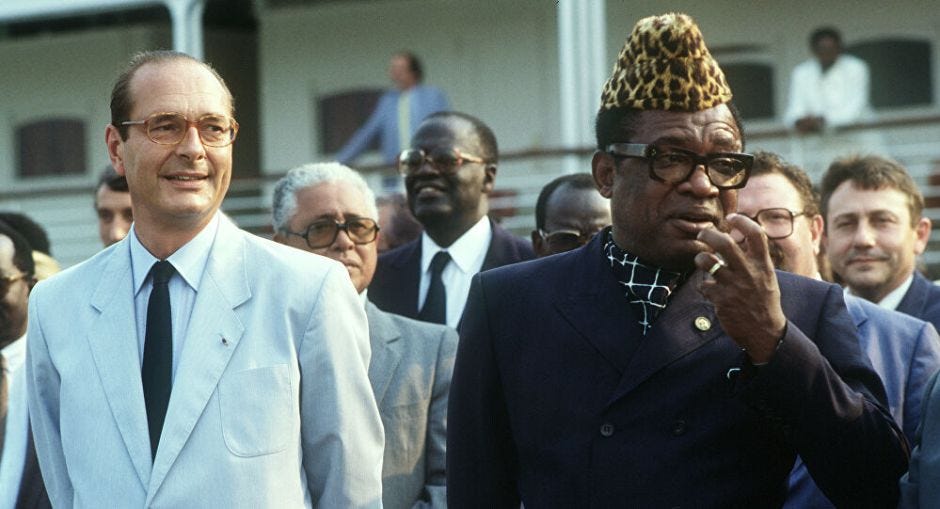The Leader as Gardener
Some thoughts from the Râșnov Festival of Film and History

I recently had the pleasure of attending a debate on leadership held by this year’s Râșnov Festival of Film and History. Râșnov is a lovely town in Transylvania, surrounded by forested hills, perfect for hiking during hot summers, and not far from many of Romania’s major tourist attractions, such as Bran (“Dracula’s) Castle and Brașov (originally founded by German settlers as Kronstad). I certainly recommend visiting or staying there if you have the opportunity.
The debate featured three animators of the popular YouTube channel Zaiavet, which covers various historical, political, and societal topics, including lengthy videos on historical figures like the Ceaușescus and Kemal Atatürk, and interviews with political leaders like former EU commissioner Dacian Cioloș. With over 850,000 subscribers, Zaiafet’s audience makes up almost 5% of all Romanian speakers, whether in Romania, Moldova, and the diaspora scattered across the world.
Each speaker presented a different answer on the question: “Do we still need leaders?” Mihai (I know the speakers personally so will use first names) focused on the risks of “providential leaders” and the need for institutions, social participation, and activism for real progress. Lucian argued that strong leaders were critical in “key moments” and are often the ones who create or reform institutions, citing many historical examples.1 Horia discussed the various pathologies of the cult-like leadership of one Donald J. Trump.
Râsnov Film and History Festival is organized in collaboration with a summer school, so there were a lot of students and young people in the audience, but also some older folks. Maybe half of the follow-up Q&A discussion focused on Trump: another victory for an attention-seeking narcissist and indication of American cultural hegemony. I myself was able to ask a question in my imperfect română.
The debate was followed up with film screenings of documentaries on Charles de Gaulle and Golda Meir. (Patrick Rotman’s 2017 De Gaulle: The Last King of France is a good primer on de Gaulle’s presidency (1958-1969), covering his establishment of the presidential Fifth Republic (replacing the unstable parliamentary Fourth Republic), the delicate and violent extrication from Algeria, his foreign policy of “grandeur” and independence from the United States, and his failed response to the May 1968 protests. The film is generally quite good, especially in reliving de Gaulle’s major speeches, public gatherings, and triumphant foreign trips, though it is rather abrupt in places, such as assuming prior knowledge of de Gaulle’s previous career and what sparked May 68. I did not have the chance to see the film on Meir.
I have thought a lot about political leadership in my study of history and modest participation in and around government. It seems to me that a part of our human psyche craves a strong charismatic leader, perhaps reflecting the role such personalities may have had in unifying and leading our ancestors’ prehistoric tribes throughout our evolutionary history. The figure of the “commander” seems to have a particular appeal for many boys and men. Even in our mass societies, and particularly since the invention of radio and film/TV, one may have a kind of virtually intimate relationship with such leaders, who are called upon to “get things done” in the face of political gridlock and impersonal parliamentary, economic, or other forces.
Strong executive leadership seems most needed in periods of crisis, marked by civil disorder or outright war. That is when the leader’s capacity to decide and unify, often with swiftness and secrecy amidst events, seems most crucial. At such decision points especially, the leader appears like the steersmen of the ship of State, charting a course that one hopes is secure.
The office of dictator was initially instituted by the Romans to temporarily grant extraordinary powers to an official to solve a particular problem. In a somewhat similar way, Abraham Lincoln and Charles de Gaulle both took on exceptional powers, including authoritarian actions, to deal with existential crises.
The need for such leadership in crisis situations is dangerous as such. The fate of millions comes to depend on decisions taken by one person and his team. Such leaders will have the same human imperfections of instability, moodiness, and potential for error as the rest of us. Indeed, most who rise to the top will have been extraordinarily power-hungry, willful, and ambitious to get there in the first place. And there may be few remedies for the abuses of a powerful executive or, worse, its unilateral seizure of further power.
There are “autocrats” who have arguably used their power wisely. Carol I of Romania—a German princeling imported from Prussia to become the first king of united Romania (1881-1914)—is said to have been a dutiful monarch, presiding over a period of much-needed stability and economic development. Lee Kuan Yew of Singapore, an illiberal democrat, successfully transformed his country from an insecure third-world port-island to the wealthiest country in Asia. Authoritarian means were instrumental to crushing communism in Singapore, maintaining social, ethnic, and religious peace among a multicultural population riven with racial tensions, and enabling far-sighted economic policies and pragmatic governance, free from politicians making short-term electoral promises.
Most leaders are not of this caliber however. For every Charles de Gaulle and Lee Kuan Yew, you will have perhaps two or three dozen Mao Zedongs and Mobutu Sese Sekos. In his dialogue the Statesman, Plato makes an uncharacteristically grounded political observation: while democracies tend to be middling or average (being as good or bad as their citizenry), autocracies have more variance, being capable of being both the worst and the best régimes, depending on the character of the autocrat.2 The resort to a dictator is necessarily a crapshoot, and once the power is delegated, it is not easily returned.
It seems to me that the most dangerous risks in a dictatorship are to want things quickly and to grossly exaggerate the ability of the State to achieve desirable outcomes. These are traits of revolutionary and totalitarian dictatorships, respectively. As Hobbes famously argued, autocracy is often an effective way of restoring basic order and stability. However, it is not clear it has many virtues beyond this.
Political revolutionaries and totalitarians often seem to believe that solving complex social and economic problems such as underdevelopment, poverty, corruption, or national humiliation are merely a question of political will (revolutionary/totalitarian dictatorships do certainly have plenty of that). However, the results are most often disastrous. Mao’s attempt at forced industrialization in the “Great Leap Forward” led to the starvation and death of 15 to 55 million Chinese. In the vast Central African country then known as Zaire, Mobutu’s seizure of foreigners’ business assets and transfer to native Africans (“Zairianization”) led to short-term plunder, bankruptcies, and flight of foreign investment. (To learn more about Mobutu’s 32-year reign over sub-Saharan Africa’s biggest country, see the excellent documentary Mobutu: King of Zaire.)
Many more examples could be cited. The efforts of revolutionary/totalitarian dictators very often seek to answer real aspirations of their people for equality, development, or ethnic/national pride, while typically making things worse. The society emerges damaged, traumatized, set even further back. The dictator then is like a deranged horticulturalist: relentlessly hacking, exhorting, and whipping the tender plants of his garden in the hopes that they may swiftly grow perfect.
Things take time in human affairs. Beyond the exhilarating and terrifying moments of crisis and decision, a good leader’s work is more like that of a constant gardener, aware of the limitations of their power and working with the grain of nature, always tending with care. Development and prosperity are not achieved by ecstatic rallies, planning targets, or the annihilation of designated enemy classes, but rather by developing the free interplay of a market economy, clean institutions, social trust, and human capital (both cultural and genetic).
It seems to me such limited, realistic expectations of government are what leaders like the U.S. Founding Fathers, Lee Kuan Yew, and Charles de Gaulle understood. Government and leadership are crucial and necessary, but there must also be a realistic awareness of what the limits of what these can achieve. I was very struck reading an uncharacteristically optimistic letter of George Washington, early in his presidency, to his friend the French General Lafayette:
While you are quarreling among yourselves in Europe—while one King is running mad—and others acting as if they were already so, by cutting the throats of the subjects of their neighbours: I think you need not doubt, My Dear Marquis we shall continue in tranquility here [in America]—And that population will be progressive so long as there shall continue to be so many easy means for obtaining a subsistence, and so ample a field for the exertion of talents and industry.
It seems to me this simple passage summarizes a great deal regarding the rise of America and the decline, first of France in the nineteenth century, and then of Germany and Russia in the twentieth, in no small part due to their devastating political explosions at the hands of fire-eyed revolutionaries.
With the rise of social and alternative media, as well as discontent on globalization, there is little doubt populism is here to stay, together with their associated charismatic leaders and the risks thereof. Personally, I am convinced major populist events such as the election of Trump and the vote for Brexit could not have occurred had there not been a growing chasm between elites and much of the people. Not only are there radical differences of opinion on globalization (especially the associated immigration and inequality), but there is also simply mutual contempt. The rise of woke will no doubt only increase such polarization.
Here is the question I asked at the event: To prevent polarization and populism, how can we reduce the gap between elites and the people as a whole? I hope we find an answer!
By the way, Lucian Vasile has edited a edited a wonderful bilingual photo album on Ploiești, then a major Axis oil city, in World War II. The book focuses on the daily life of locals and German soldiers, as well as architecture and the Allies’ bombing campaign. A great book for any WWII buff!
I think Plato gets at something important here though I only partly agree, insofar as I believe the best régime will have substantial participation—and therefore cannot be a pure autocracy—according to the wisdom and virtue of each citizen.




